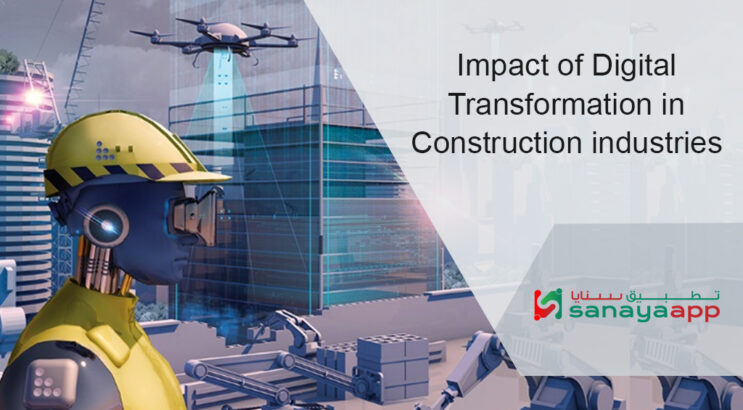Impact of Digital Transformation in Construction Industries
It is an era where everything and anything in the world gets digitalized in every blink of an eye. Now we live in an ultra-modern era, where money flies invisible in the air and we can go on vacation to the moon. As the world evolves the construction industries swiftly transforming to Digital Transformation for more efficient results and work progress.
Gone are the days, where people indulged in the traditional way of construction. The bricks, cement, labours and conventional roofs are no longer the only components involved in the construction industry. Planning and curating a construction project with digital transformation devices helps in swift progress and completion.
How can digital transformation reshape the construction industry?
Because construction demands so many moving parts and partners, an increasing number of enterprises are embracing digital transformation to more desirable coordination with their people and to streamline business operations. As a result, ending traditional analogue systems will go extinct.
However, digital transformation isn’t only in the progression of projects. It involves creating smooth communication, providing the latest digital tools and enhancing the finest data to provide an effective working environment.
Further, digital transformation has been successful in benefiting firms with a 300% ROI. Moreover, remember the fact that 7% of the world’s population work in construction industries. Employing digital transformation can modify many labour lives and swift completion of projects in time.
Digital transformation is a wise and cost-effective investment. So, here we are about the impact of digital transformation in the construction industry.
A Digital Partner Among the Employee
Traditional, analogue methods are frequently prone to human error. They slow down processes, don’t provide a good way to collect and/or analyse data, and are expensive to store. These systems also tend to overburden management and place unnecessary administrative burdens on both field and office employees. Miscommunication always exists when construction paperwork and instructions remain in the physical world.
Finally, many companies are unable to truly extend their business, as they are stuck in paperwork and manage unstructured, ineffective processes that are no longer working for their companies. By using digital transformation, businesses can generate profits by reducing human error and streamlining their business processes. The right technology solutions can increase productivity by eliminating needless work. Therefore, enhancing communication and reporting to the company.
The Accuracy & Safety Factor
When the rest of the world came to a halt last spring due to the COVID-19 pandemic, the construction industry whirled to protect workers and keep critical projects rolling ahead. This is possible as a result of digital transformation. With digital tools in the hands of field workers, project managers, and administrative personnel, businesses could bring certain operations online and collect data directly from the field. Workers could clock in using their smartphones, answer digital safety surveys, stream safety videos, report safety, hazard issues, and track their day’s work. All this is possible without ever communicating with another worker.
Digital tools that collect and generate live field data will continue to be critical in making decisions. Companies can make critical decisions on the fly with this information at their fingertips thanks to digital transformation. Mobile applications, digital data and stored information can pave the way for smooth decision making. If data indicates that one project is falling behind schedule, staff and equipment can be given over from one project to another, to keep all projects on track.
The Futuristic Data Solutions
Construction crews frequently work in separate pits or the planned crew network. Construction companies can connect their independent teams and consolidate labour, safety, purchase, change orders, progress, and supplies management in one place by embracing digital transformation efficiently utilising the digital platforms available to them.
This means that actionable data can be in the hands of the perfect person who can influence change. Companies can align their operations for better decisions when data is bound and stored; Across all departments and teams. With the data gathered from the various projects in the past, futuristic data can help in avoiding future errors in construction projects.
The Long-Term Savings
Some contractors are still concerned about the costs of digitally transforming businesses. However, the cost of not implementing technology is far greater.
For example, after tripling the number of employees, a commercial speciality contractor implemented a digital transformation strategy. It rendered the contractor’s paperwork time card and data collection systems easily tractable.
The company implemented a mobile workforce management solution that enabled it to sync its time tracking, field reports, and job requirements. Regular and overtime hours alone saved the company more than millions by automating data and following it with other projects.
It’s predicted that 50% of B2B queries today is done with smartphones and mobile apps. If companies are not accessing the latest technologies they will sink as non-competent firms.
Competitive Engagement
Developers and owners are now looking for a tech supporter or assistant while formulating bids. Customers would like to work with companies that complete a project on time and within budget. Their choice is increasingly based on contractor technology, even if the proposal of the contractor is not the lowest quote. Similarly, the companies engaged with the acute and proper technologies can surge on top of the competition.
Technology interprets data for customers with more suitable clarity. Moreover, decision making in long term is simplified in today technology. Today’s digital transformation allows companies to track project progress with a one-stop solution. These data collected often directly in the field and built into the ERP system means that project managers and customers can accurately image labour costs and production costs in real-time.


